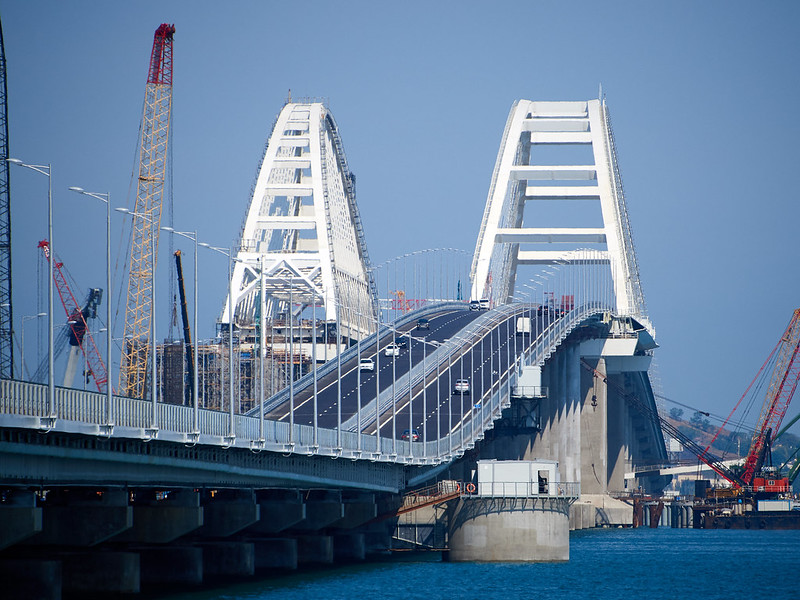 Kerch Bridge, photo courtesy of Anton Romanko via Flickr
Kerch Bridge, photo courtesy of Anton Romanko via Flickr
Crimea and Kherson: The Kerch Bridge’s Importance
As Russia’s position in Kherson, the only regional capital that Russia has captured and a key strategic location for securing Crimea is currently in jeopardy, the Ukrainian military is undoubtedly looking for ways to increase the pressure on Russian forces located in the city. The October 8th explosion on the Kerch bridge, which connects Crimea to Russia and is a major logistical artery for Russia’s military, represents a blow to Russia’s military operations in Crimea and occupied Ukrainian areas adjacent to the peninsula, including Kherson. While Ukraine has denied responsibility, it is generally assumed that the attack was organized by Ukraine. The attack demonstrates the inability of the Russian military to control the battlespace in Ukraine and highlights the vulnerability of major Russian infrastructure and logistics. Moreover, it’s a symbolic blow given the bridge’s status as the physical link between Russia and Crimea, but, the most damaging element of the explosion is potential impact on Russian logistics and Russia’s ability to hold its gains in Ukraine.
While the situation in Kherson is difficult, the city is extremely important to Russia. It therefore appears that Russian forces are unlikely to retreat as quickly as in northern Ukraine around Kharkiv. In fact, Putin has specifically denied requests from military commanders to allow Russian forces to withdraw from the city. Russian forces are also well dug in, so it’s likely that fighting around the city will be heavier and more protracted than in the North. This is especially true since the Russian troops in Kherson are of significantly higher quality. Russia’s ability to supply its troops will therefore be exceedingly important. The Kerch bridge is a key logistical route for material going from Russia into Crimea, which can then go onwards to Kherson. Therefore, a lowered capacity or outright inability to use the Kerch Bridge would be significantly deleterious to Russia’s ability to hold the city. According to the UK Ministry of Defense the attack on the bridge has already had a real effect on Russia’s logistics in southern Ukraine.
Currently, however, the Kerch Bridge is not the only logistical route that can supply Kherson. However, it is by far the most practical option. The only other option is a rail line running from Russia through Eastern Ukraine and Melitopol, which is far more vulnerable to disruption. Melitopol is close enough to the front line in Donetsk that its vulnerable to intensive Ukrainian attack. Moreover, the city is within range of Ukrainian rocket strikes and has been a consistent target for Ukrainian partisans.
As Ukraine has gone on the offensive against Russian forces in its territory, a key part of Ukraine’s strategy around Kherson has been to logistically isolate Russia’s troops there. This has involved blowing up major bridges over the Dnieper River into Kherson. This makes resupplying troops in the city significantly more difficult, which has complicated the defense of the city and increased the importance of maintaining a robust logistical tether to Kherson. Any issues supplying the city would exacerbate the already existing difficulties of moving supplies over the river.
Losing its forces in Kherson is not an option for Russia politically, militarily, or logistically—but neither is losing the city itself. Beyond the Kremlin’s “annexation” of the region, the city of Kherson is strategically important. Crimea’s water supply runs through the North Crimean Canal, which originates 80 kilometers east of Kherson. While Crimea has managed its water problem since 2014 (albeit with some difficulty), this is becoming increasingly problematic, as Crimea’s indigenous water supply is now both running dry and increasingly polluted. Beyond the effects on Crimea’s population and agriculture, a steady supply of water is also needed for Russia’s naval base at Sevastopol, the linchpin of Russia’s Black Sea presence. Crimea’s water shortages will also cost Russia six billion dollars in the next three years alone, whereas building the entire Kerch Bridge only cost four. For this reason, Russia wants to control the entire canal. A successful Ukrainian counteroffensive capturing Kherson would set up Ukraine for a wider offensive in the spring, which would endanger the Russian-occupied land bridge to Crimea and subsequently allow Ukraine to increase its military focus on retaking the peninsula. While militarily retaking Crimea appears exceedingly difficult, significant ongoing military action around the peninsula would damage Russia’s position there.
All of this shows how important Kherson is to Crimea and the Kremlin’s war aims, and how important the Kerch Bridge is for Kherson. Protecting the bridge will elevate as a Russian priority, even in light of the symbolic importance already ascribed to it before the explosion. Repairs on the bridge are underway, and both road and rail traffic resumed partially within two days of the explosion, so the logistical route through Crimea remains open. However, the explosion, combined with a high-profile series of Ukrainian attacks on Crimea during the summer and Ukraine’s efforts to cut off Russian soldiers in Kherson, show exactly how vulnerable Russia’s position in Kherson is, and what that means for Crimea.
Image license under creative commons





